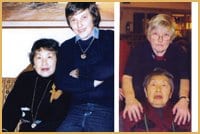Plum Living Properties is scouting for a site to set up Vancouver’s first residential community catering specifically to queer seniors.
“In doing this, the model we followed was not ‘If you build it, they will come.’ It was, ‘What do you want?'” says Dean Malone, owner of Plum Living which is undertaking the project with US partner, RainbowVision Properties.
The partnership, which is looking for property in the Mount Pleasant area, is planning 150 condominiums, 25 assisted living units and amenities such as home health care services.
“We want this community to reflect what people are actually looking for,” says Malone, who is hoping to open the site in four years.
For many queer seniors beginning to wonder what resources will be available to them when they can no longer take care of themselves, the Plum project may be an option worth considering. Malone says the response has been strong so far, with over 30 deposits collected in the first week alone.
“There are enough LGBT boomers around who are out and living their lives and have expectations,” Malone says. “When they see something real, they jump at it.”
Homes like this are needed, says Claire Robson, coordinator of the Queer Imaging and Riting Kollective for Elders (Quirk-e).
“Isolation, health issues and depression are a huge issue for any aging population. Anything that brings them together has got to be good — and rare,” Robson says.
Retirement communities for gay seniors are valuable, George Fuller agrees.
“I think there’s been a lot of discrimination against queer folks in retirement homes. I think it’s a really good idea,” says Fuller, noting that there’s nothing comparable in Vancouver to what Plum Living has to offer.
“There are very few homes that are clearly welcoming,” agrees Chris Morrissey, program coordinator of the LGBT Generations Project. Morrissey, who works to make straight residential care homes in the public system more welcoming to gay seniors, says the reason for that is partially homophobia, but heterosexism also plays a role.
Seniors homes tend to ignore sexuality in general, whether you’re straight or gay, she says. But in the case of queer seniors, they can be pigeonholed in their sexuality while simultaneously being ignored because of it, which leads to invisibility, she explains.
The cost of residential care is also a major concern for aging queers, Morrissey points out, noting that the Plum project may be cost prohibitive to many members of the gay community.
“I believe that it’s always important for people to have choices,” she says. “Unfortunately, because of financial restraints, many people in our community don’t have choice. While Plum Living is great in terms of providing another option for people, it’s primarily going to provide that option for people who can afford it,” she contends.
Jeannette Piry, whose partner Grace lived out her final days in the gay-friendly Royal Arch Masonic Home, is also concerned about the cost of private facilities like RainbowVision.
“It seems to me that this project is geared towards well-heeled seniors,” she says. “Not all gays have money and can afford it.”
Malone acknowledges that not everyone may be able to afford a place in the Plum community, or even be interested in what it has to offer, but says there have been enough inquiries — over 18,000 across Canada so far — to indicate a significant interest in the project.
Despite the cost, Piry believes having specifically queer seniors communities is a positive step.
“It’s a good idea to think of the gay community as getting old and needing good care, visibility, and equal treatment,” she says.
“Nothing that is new is a bad idea to try,” she continues. “It’s like bursting a balloon open. Then people will realize that there are gays that are not only rich, but who also need help.”
For her part, Morrissey believes many people want to stay at home as long as possible and should have more options for that as well. “I think that affordable housing is more critical,” she says. “A lot of people in our community don’t want to live in what they identify as a ghetto. Some of them want to, and already have, a broader social network.”
Robson and Fuller say they want to remain independent, vibrant, active and engaged well into old age.
“One thing we can break away from is seeing seniors as done for,” Robson says. “Use them — they’re a fabulous resource.”

 Why you can trust Xtra
Why you can trust Xtra


